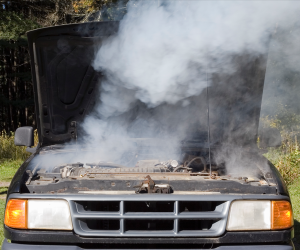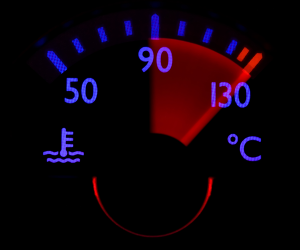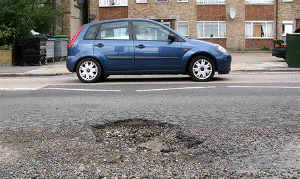What to Do When Your Car Overheats
It might be a flashing light on your dashboard.
Or, a temperature gauge needle gliding into the red zone.
Or, maybe a readout on your dash display saying “temperature warning.”
Or, perhaps it’s billows of steam coming out from under your hood.
One way or another your car is telling you it’s too hot.
So what do you do when your car overheats?
First, you need to pull over safely. If possible, find a gas station, roadside rest stop or business that you can pull into. They may also have water and/or tools you will need.
Do not take off the radiator cap! This is important. You need to wait for your engine to cool down before you remove the radiator cap. If you remove it too soon the steam may severely burn you.
Wait for your engine to cool down. While you wait, you can pop the hood and look for signs of a broken hose or leaking coolant. However, use common sense. If there is steam coming out of your hood, give it some time to cool before you attempt to inspect the damage.
Once the engine is cool, you can remove the radiator cap or coolant reservoir cap. You may not need to remove the cap at all if you have a clear coolant reservoir where you can see the level of coolant.
Add coolant if it’s below the full line. If your car is overheating, you will more than likely need to add coolant. There are several different types, so consult your owner’s manual to find out which type your car needs. If you don’t have coolant, you can add some bottled water for a temporary fix. Although, you might want to check your warranty to make sure you don’t void anything.
Bring your car to a mechanic to investigate why the car is losing coolant. Your car’s cooling system is designed to be completely sealed and any signs of losing coolant can indicate problems.
How to prevent a car from overheating
There are some preventative measures you can take to help reduce the likelihood of your car overheating. Mainly, keep up with your vehicle’s maintenance.
Get routine oil changes. Most quick lube, dealerships and mechanics will check the coolant level during the oil change.
Follow a regular maintenance schedule provided by the manufacturer, including the intervals when your vehicle’s coolant should be flushed and replaced.
Periodically check your coolant levels as directed by your vehicle’s manufacturer.
Have your vehicle checked for worn belts and hoses yearly, or as recommended by your vehicle’s manufacturer.
If you notice your coolant needs to be refilled regularly, you probably have a leak that needs repair.
Why do cars overheat?
Typically, overheating is because your vehicle does not have enough coolant. Low levels in the coolant tank are commonly caused by a worn out water pump or a deteriorated or loose hose. This can be hard to spot but a trained mechanic should be able to see it.
So, by staying on top of routine service, you will likely be able to avoid it along with a slew of other potential problems.

How can I utilize my road trouble service when my car overheats?
If you find yourself on the road and stranded with an overheated car, it’s a good time to utilize your insurance’s road trouble service. You can typically find instructions on how to reach your road trouble service provider on your proof of insurance cards.
If you have Emergency Road Service on your Insurance policy, you should call to make a claim. If you are renting or borrowing a vehicle, you should still call the ERS. You will need to provide your policy information along with details of your vehicle’s situation. A service provider should be dispatched to your location for assistance.
Also for auto policies, your emergency road service limit applies to the overall cost of services. So, any out of pocket expenses should be communicated to you before help is dispatched.
To learn more about Emergency Road Service, contact your local, independent Bolder Insurance Advisor at 303-449-9595 to learn more.
This article is provided by Auto-Owners Insurance, a Bolder Insurance partner.






